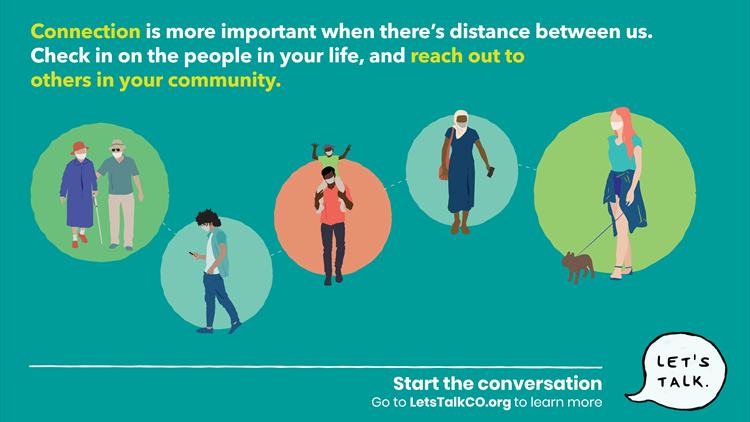COLORADO, USA —
CONTENT PAID FOR BY LET'S TALK COLORADO.
For most of us, adapting to a new routine of remote working, home-schooling, and isolation during the COVID-19 pandemic has been and will continue to be difficult. On top of that, fear and anxiety about a new disease and all the uncertainties that lie ahead of us can cause strong emotions and take a severe mental toll.
Healthily coping with stress and anxiety now will go a long way in building resilience, according to Jessica Dunbar, VP of Business Development and Community Engagement at Jefferson Center.
"We are sharing a common experience like no other," says Dunbar. "This is a good time to go online and get familiar with the mental health resources available to help you cope better, because you never know when you or someone you know may need them."
Jefferson Center is a nonprofit community-focused mental health care and substance use service center. According to Dunbar, there's been a definite increase in the number of calls to the crisis center, and a higher demand for support at the walk-in centers, since the onset of the COVID-19 pandemic.
Dunbar says the staff has seen different waves of concerns throughout the past few months. Right now, it's back-to-school stress and uncertainty around the plans and safety for kids this fall. Parents feel overwhelmed with concern, on top of new routines, and a disruption to normal life, all while trying to keep their family healthy.
Dunbar recommends exploring the Let's Talk Colorado website, available in English and Spanish, which has suggestions to help Coloradans open up about their stress and other feelings. She encourages people to share the information with others, including the 24/7 crisis lines, 1-844-493-TALK, or text "TALK" to 38255, for help and support.
According to Dunbar, sharing information about how to manage and support our mental health is helpful for ourselves and our loved ones. Simply connecting with those we care about is critical to our psychological well-being during times like this. It is helpful to remind people that our emotional health is just as important and our physical health.
"Even though we can't physically be together, maintain relationships in any way you can. Make that phone call, write that email, text, and check-in with friends and family members as often as possible," says Dunbar. "Staying close and reaching out to people regularly is so important. They need it, and we need it."
While an encouraged or enforced quarantine may be only temporary, the isolation and loneliness can have consequences, leaving people feeling like they have no control over the situation and cut off from the rest of the world.
25-year-old Shelby Calloway says she feels like she's living in a bubble while watching people on social media get back to some normalcy, knowing that she can't take the risk. Calloway has been in quarantine since the end of February, under doctor's orders, because she lives with Systemic Lupus and Common Variable Immunodeficiency.
"For me, it's a severe life or death situation," says Calloway. "I am prone to infections and only have 70% lung capacity in normal circumstances. My doctors said that I would need to remain in quarantine until a vaccine is developed, which could be two years." Not surprisingly, Calloway says she's feeling anxiety, anger, and depression, and worries that in that time, despite all her precautions, she may still end up getting the COVID-19 virus. Calloway's psychological distress is two-fold.
"Assuming that I survive all of this, I feel like I'm losing two years of my life," says Calloway. "I just turned 25. I could be dating and going to college, but I'm just trying to survive - to get through the day, the week, the month."
Callaway’s scenario is a genuine one for so many Americans that are more at risk of contracting COVID-19 because they are immunocompromised or have other health conditions. Behavioral health experts say the increased risk factors can lead into higher emotional stress, anxiety or depression for these people.
Dunbar emphasizes that, for many, this may be an ideal time to reach out to a therapist, someone who can help you cope with COVID-induced depression and grief. She encourages people to use Jefferson Center to connect with professionals who can help with everything from mental balance to substance abuse.
For Calloway, a routine of weekly virtual visits with her therapist, the right antidepressants, yoga, clean eating, and walking her dog helps her maintain good mental health and build resiliency for the long haul.
Calloway says the first place she’ll go when she can finally leave quarantine is the Denver Art Museum.
THIS ARTICLE INVOLVES COMMERCIAL CONTENT. THE PRODUCTS AND SERVICES FEATURED APPEAR AS PAID ADVERTISING. FOR MORE INFORMATION, EMAIL US.
COLORADO & COMPANY IS A PART OF 9NEWS AND FEATURES COLORADO EVENTS, COMPANIES, BUSINESS PEOPLE AND OTHER OTHER GUESTS FROM AROUND THE COUNTRY.



